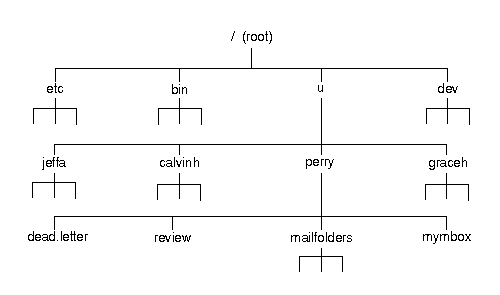
|
|
After a while, files start to accumulate in your home directory. To keep things organized, you can create some subdirectories within your home directory. If you keep several different types of files in your home directory, you can create subdirectories for each type and divide your files among them. Then, when you want to work with a particular group of files, simply go to the subdirectory that holds them.
For example, you might create a letters subdirectory in which to keep your letters, and separate subdirectories for particular projects you are working on. You can further divide your new subdirectories. For example, you can make new subdirectories in your letters directory to organize your letters by person or subject. There is no limit to the number or kinds of subdirectories you can create.
Every directory (except one) is a subdirectory of some other directory. The directories are organized into an inverted tree structure, so called because directories branch out of other directories like the branches of a tree. This tree is ``inverted'' because the branches move down, not up. One directory, at the top of the tree, is not a subdirectory of any other directory. This is called the root directory, and its name is a slash character (/). To help clarify this, look at the following picture of part of a typical directory tree. (Note that directories have small sub-trees below them; files do not.)

Notice that directories have lines
leading to files or other directories.
Files do not have any lines coming out of them
because they
do not lead to other files or directories.
Remember that this is only a small portion of the entire
directory tree.
In reality, most directory trees are much deeper than four levels,
and each level contains many more than four files and directories.
Some directories may also not contain any files or directories.